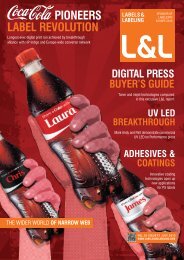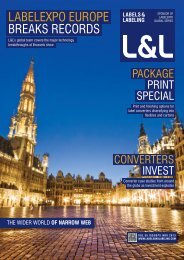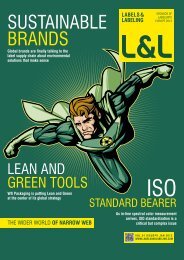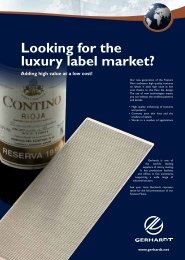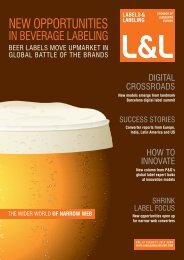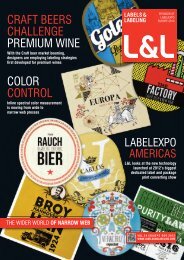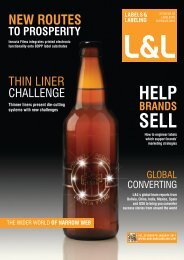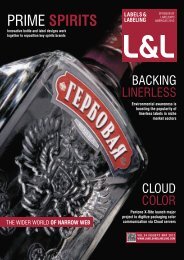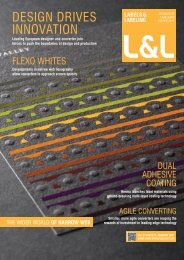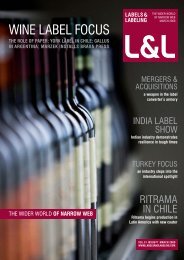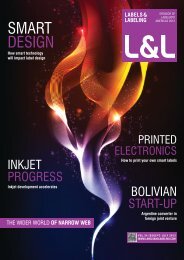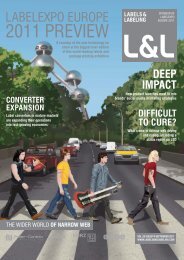THE DATA FRONT
Download as PDF - Labels & Labeling
Download as PDF - Labels & Labeling
- No tags were found...
Create successful ePaper yourself
Turn your PDF publications into a flip-book with our unique Google optimized e-Paper software.
102 | l&l<br />
Martin Automatic has<br />
introduced the LRH automatic transfer rewind<br />
handle heavy coreshafts, and a rigid outboard support system<br />
negates spindle deflection. Unlike conventional turret winders,<br />
the rewind spindles of the LRH traverse horizontally. This linear<br />
design minimizes roll travel as well as the tension upsets and<br />
web shifting associated with turret rotation.<br />
It is offered in standard widths to 32 inches (813 mm) and<br />
standard diameters to 72 inches (1830 mm). Wider widths and<br />
specially-engineered features are available.<br />
At Labelexpo Americas in Chicago last year, Scantech<br />
launched the PharmaTrack – a machine for pharmaceutical<br />
label validation and verification.<br />
PharmaTrack features include bi-directional web processing<br />
at full speed, and vision inspection and re-inspection capability.<br />
The machine allows barcode printing and verification adaption,<br />
including E-Pedigree conformation. The automatic open<br />
loop unwind/rewind system is servo-driven, while a job recall<br />
capability includes unwind and rewind tension settings.<br />
Also launched at the same event was the company’s<br />
VisionTrack for 100% inspection and converting of labels.<br />
Like the PharmaTrack, the servo-driven machine has vision<br />
inspection and re-inspection capability, as well as the barcode<br />
printing and verification. It includes a fault retrieval system and<br />
three levels of password protection.<br />
Another company to offer slitter rewinders with inspection<br />
capabilities is France-based Smag, whose range is composed<br />
of four different product types: the DCR 2000 table-top<br />
inspection range; the C4R+ inspection line; the Venus<br />
semi-automatic turret rewinder ; and the Neptune, which allows<br />
the operator to be seated when working the machine.<br />
All these machines are modular and can be connected to<br />
a 100% quality control inspection system, thanks to Smag’s<br />
cooperation agreement with Israeli inspection specialist AVT.<br />
Italy-based Prati’s range of machines provides versatile<br />
solutions in the finishing of PSL, filmic substrates and special<br />
materials. Saturn, Jupiter and Vegaplus are servo-driven<br />
machines equipped with automatic tension control and a<br />
self-sharpening shear slitting system which is able to slit paper<br />
and plastic material from 12 micron up to 1.5 mm in thickness.<br />
The machines are retro-fittable at any time with several<br />
accessories for standard and special applications.<br />
Jupiter is the most versatile machine in terms of materials that<br />
can be processed, from flexible packaging to cardboard and<br />
from paper labels to booklets.<br />
When processing film substrates, the machine is equipped<br />
with three different rewinding tension settings managed by<br />
VaryControl software. As a result, the material keeps a constant<br />
web tension and avoids any stretching. An air-driven separator<br />
allows rewinding of all rows in a single shaft without crossing<br />
the substrates or damaging the web edges.<br />
Vegaplus, with its modular design, has an unwinder with<br />
Labels&Labeling<br />
Kmec’s Label CS machine can handle a variety of materials, such as paper,<br />
metalized paper, polyethylene and BOPP, among others<br />
motorized reel loading and an automatic turret rewinder. The<br />
machine can be fitted with one or more die-cutting units,<br />
flexo or inkjet printing units, a leaflet feeding unit and video<br />
inspection systems. It may be used to work webs from 330mm<br />
up to 530mm in width.<br />
Girona, Spain-based Kmec, meanwhile, manufactures<br />
equipment for the paper converting, flexible packaging, label,<br />
coating and laminating sectors. The company’s Label CS<br />
machine, which can handle a variety of materials, such as<br />
paper, metalized paper, polyethylene and BOPP, sheets and<br />
cuts many types of labels, including wet-glue, wrap-around and<br />
in-mold. Its modular design allows the inclusion of equipment<br />
for embossing, perforating and die-cutting, among others.<br />
Francesc Terricabras, Kmec’s labeling marketing manager,<br />
says the machine requires less processes than traditional<br />
methods of producing small format products, which can include<br />
a folio-size sheeter, de-stacking, reaming and guillotining. The<br />
Label CS performs these tasks in a single process,’ he says.<br />
‘While improving productivity and reducing waste.’<br />
The machine comes in widths of up to 1,000mm, and has the<br />
potential for in-line slitting and a cut length range of 50mm to<br />
330mm.<br />
To demonstrate the machine’s benefits for the label sector,<br />
Kmec joined forces with Blumer, as shown in drupa last year,<br />
to demonstrate an automated line for the production of die-cut<br />
labels directly from a printed roll. The solution combined a<br />
Label CS small format sheeter integrated with either an Atlas<br />
1110 or an Atlas 40 from Blumer, allowing for the production<br />
of die-cut and banded labels in one process, instead of<br />
the multiple steps employed by traditional, larger sheeters,<br />
guillotines and die-cut systems.<br />
After being sheeted on the Label CS, pre-counted label strip<br />
stacks were presented to the Atlas equipment on a delivery<br />
system that included cardboard placement stations, a pressure<br />
and turning unit as well as a rotating conveyor section that can<br />
be programmed to deliver the stacks to the Atlas, for alternative<br />
processing or as a quality control facility.<br />
Joan Carbó, Kmec’s business manager, explains: ‘The line<br />
requires just two people (one for each machine) to control the<br />
operation, which compares very favorably with the traditional<br />
methods that can need four operators to undertake the<br />
unwinding, reaming, guillotining and punching processes.’<br />
Production included metalized paper beer labels (76mm x<br />
76mm) at up to one million labels, and BOPP soft drink labels<br />
(300mm x 52mm) at 752,000.<br />
Terricabras reports that a key concept behind Kmec’s<br />
machinery is individual sheeting that is fed through a central<br />
drum – a process that avoids potential inaccuracies and<br />
benefits a variety of markets, from beer labels, wrap around,<br />
and IML to format paper sheeting, for example.



